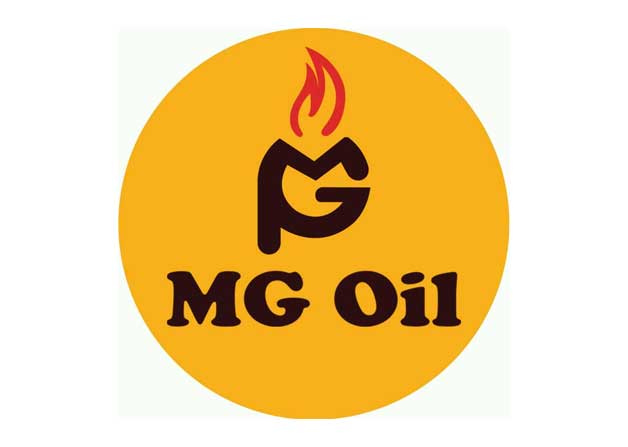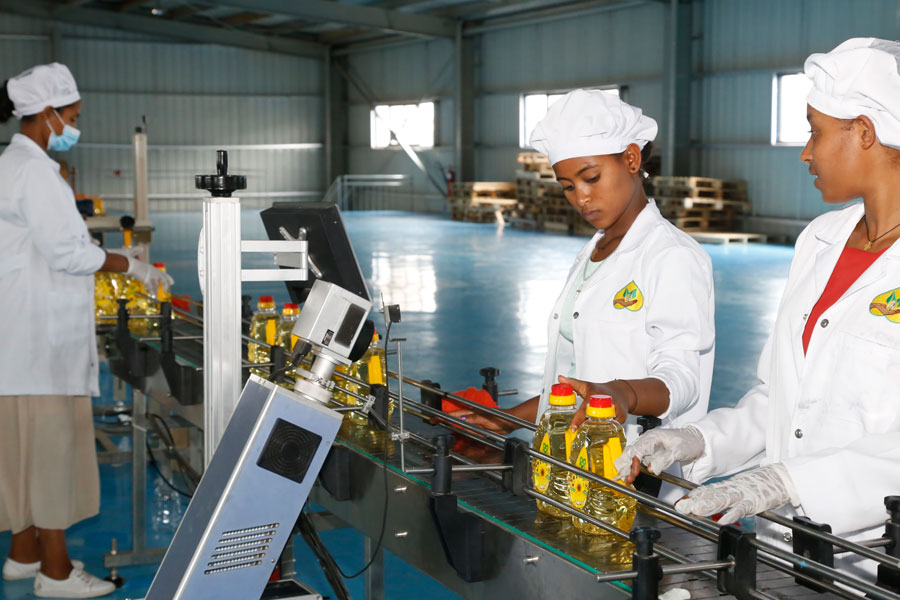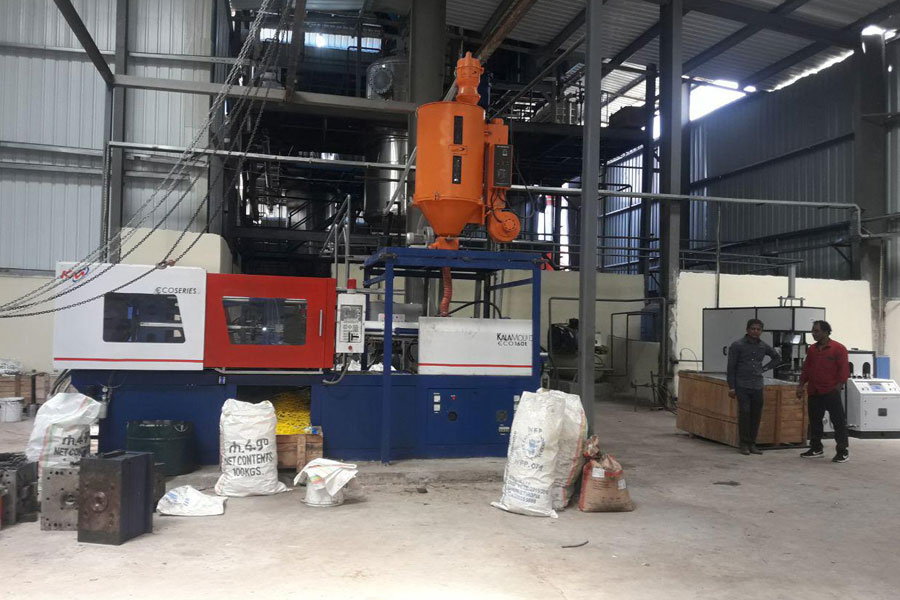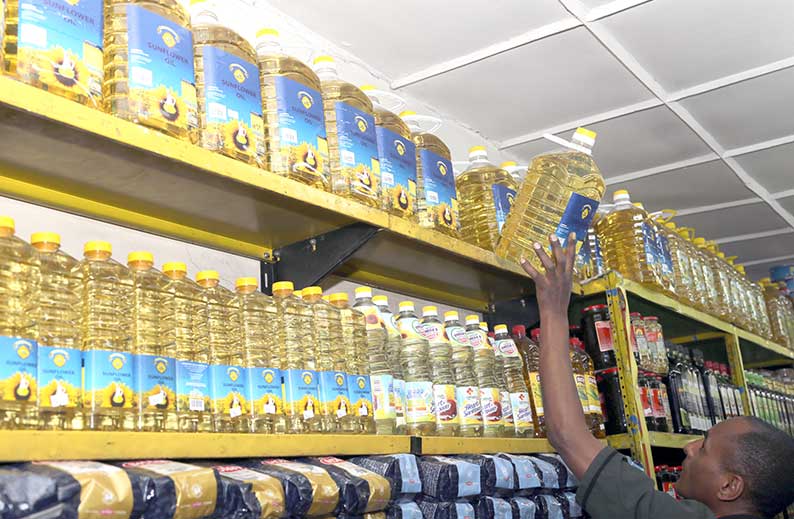
Fortune News | Jan 23,2021
Shemu Plc, a company known for manufacturing fast-moving consumer products, invested 1.6 billion Br in its already operational edible oil plant in Dire Dawa to triple its production capacity. The expansion enables the company to refine 950tn a day.
Shemu Construction, its sister company, undertook the construction of the plant, which took three years. The machinery was imported from China. The expansion will increase the total number of employees by six-fold to 1,500.
The company was inaugurated in 2017 with a production capacity of 120tn of oil a day, and it went through its first expansion in 2019, stepping its production capacity up to 230tn a day.
The plant is under Shemu Group, a conglomerate comprised of 15 companies, including Shemu Detergent and Aveza Ethiopia Retailing Company. The plant will supply waste products from manufacturing the oil to the plant that manufactures soap.
The foreign currency shortage affecting the import of raw material is one of the main culprits behind the edible oil shortage, according to Frezer Debela, the general manager of Shemu Group.
"If we're able to produce at full capacity," said Frezer, "we'll cover 46pc of the local demand."
The Food, Beverage & Pharmaceutical Industry Development Institute proposed alternative methods in 2019 to minimise foreign exchange expenses and maximise supply in the market. In light of this, the Institute is prioritising the import of crude palm oil, mainly from Malaysia and Indonesia, to be filtered and processed by domestic oil manufacturers like Shemu.
Shemu is one of the refineries that received foreign currency under this scheme to import crude palm from Malaysia. In September, the company secured 8.5 million dollars to manufacture and distribute a little over three million litres of oil through the quota allocated by the Ministry of Trade & Industry.
It was assigned to cover four regional states and one city administration through the Ethiopian Industrial Inputs Development Enterprise, Biftu Adugna Business and the Ethiopian Trading Businesses Corporation. Oromia gets the largest volume of a little over 1.5 million litres, followed by Somali and Afar that receive nearly 800,00 litres and 400,000 litres, respectively. Harari and Dire Dawa City Administration are allocated 150,000 and 270,000 litres of palm oil, respectively.
The proposal from the Institute to encourage local manufacturers to process crude palm oil is the right move, according to Yared Desalegn, an investment promotion expert.
The government should also consider enhancing oilseed farming, because Ethiopia has good potential to produce nug, sesame, sunflower, soybean and palm oil around lowland areas, according to Yared.
"As long as the government pays enough attention to such commodities," said Yared, "it might solve the problem; and it would also help the forex issue, especially since sesame is in high demand on the international market."
The government should also play a role in building investor-to-farmer relations with no interference from brokers, according to Yared.
"This will benefit both parties and allow them to grow," he said.
Shemu is among the 21 existing edible oil industries in the country that are producing 19.3 million litres of edible oil a month using 19,623tn of imported soybeans, sunflower and palm.
On average, one person consumes 0.7lt of edible oil a month in Ethiopia, and the total demand in the country amounts to approximately 70.9 million litres a month. However, domestic production sits somewhere around 47.7 million litres a month, satisfying only two-thirds of the demand.
Five cooking oil manufacturing projects, which will have the capacity to provide 50.6 million litres of palm, 27 million litres of sunflower, and 21.8 million litres of soybean oil to be filtered and distributed to the markets, are nearing their completion phase.
The total annual domestic production of oilseeds is too low, only covering three percent of edible oil production demand, according to Habtamu Taye, head of the Oil Seeds Processing Directorate at the Institute.
Habtamu also relayed that a lack of accountability by both the government and individuals who invest in edible oil also plays a role in the issue.
"The core problem with investors was that they took advantage of the incentives provided by the government that allowed them the privilege to import palm oil to the market," said Habtamu. "They paid more attention to importing palm oil than manufacturing cooking oil."
Shemu, known for manufacturing fast-moving consumer items, is now venturing into the retail business and low-cost housing construction, according to Frezer.
PUBLISHED ON
Mar 13,2021 [ VOL
21 , NO
1089]

Fortune News | Jan 23,2021

Fortune News | Jan 07,2024

Fortune News | Mar 23,2019

Fortune News | Feb 23,2019

Fortune News | Nov 23,2019

Fortune News | Jun 13,2025

Fortune News | Mar 16,2019

Fortune News | Apr 02,2022

Fortune News | May 11,2019

Radar | Aug 28,2021

Dec 22 , 2024 . By TIZITA SHEWAFERAW
Charged with transforming colossal state-owned enterprises into modern and competitiv...

Aug 18 , 2024 . By AKSAH ITALO
Although predictable Yonas Zerihun's job in the ride-hailing service is not immune to...

Jul 28 , 2024 . By TIZITA SHEWAFERAW
Unhabitual, perhaps too many, Samuel Gebreyohannes, 38, used to occasionally enjoy a couple of beers at breakfast. However, he recently swit...

Jul 13 , 2024 . By AKSAH ITALO
Investors who rely on tractors, trucks, and field vehicles for commuting, transporting commodities, and f...

Jul 5 , 2025
Six years ago, Ethiopia was the darling of international liberal commentators. A year...

Jun 28 , 2025
Meseret Damtie, the assertive auditor general, has never been shy about naming names...

Jun 21 , 2025
A well-worn adage says, “Budget is not destiny, but it is direction.” Examining t...

Jun 14 , 2025
Yet again, the Horn of Africa is bracing for trouble. A region already frayed by wars...